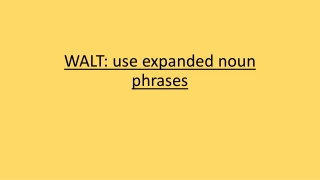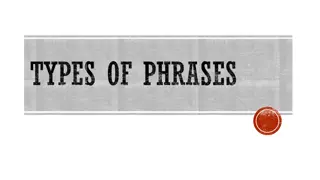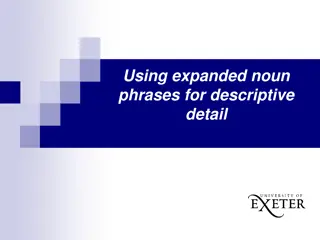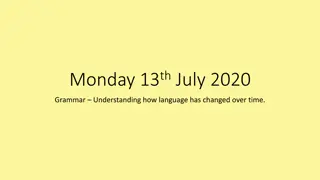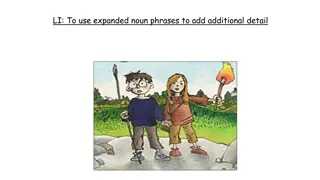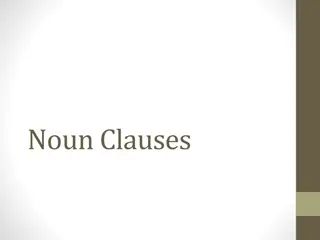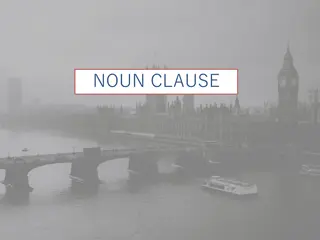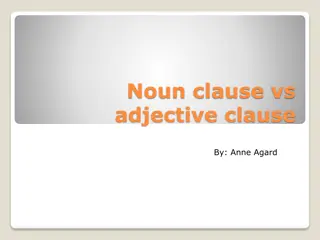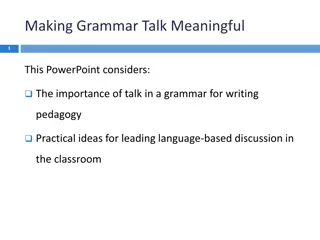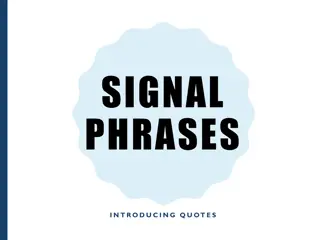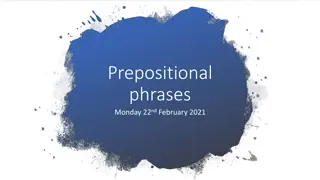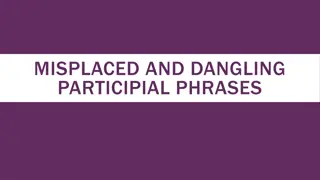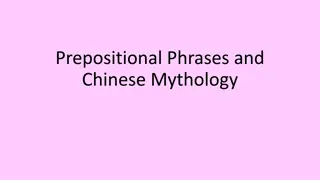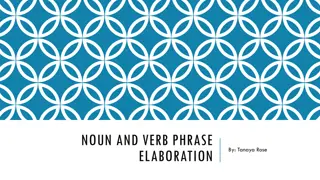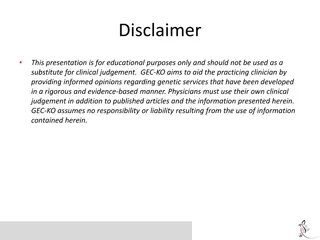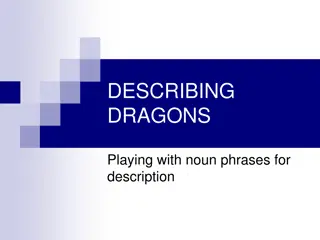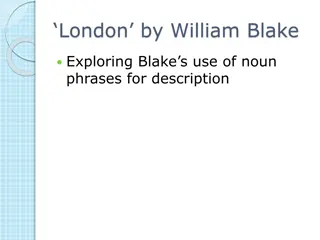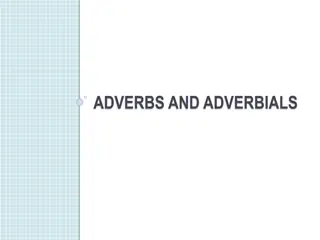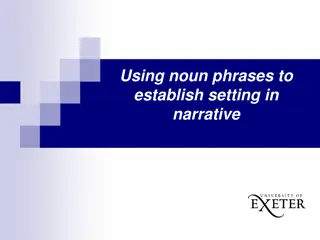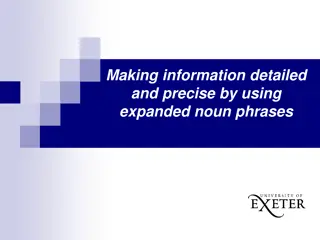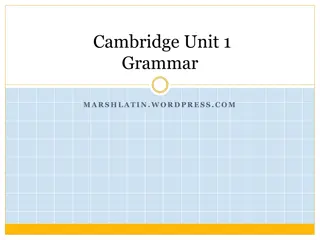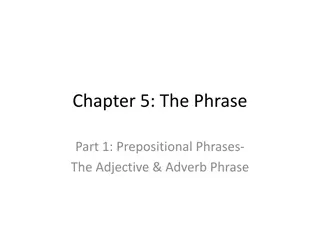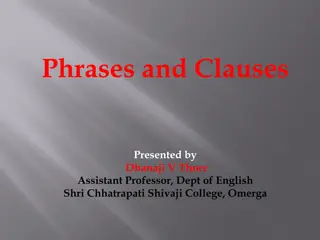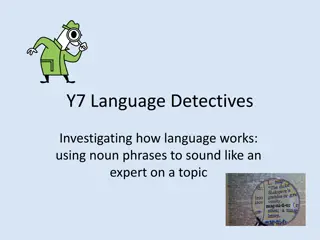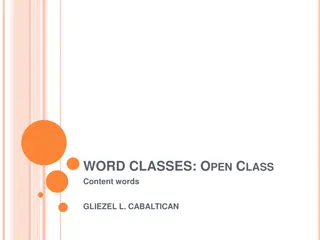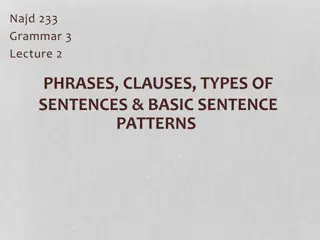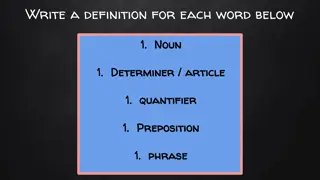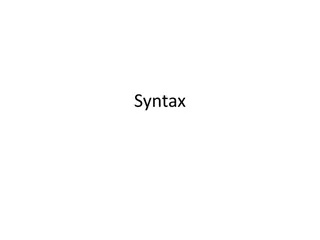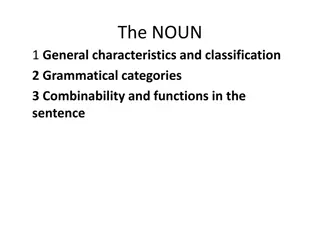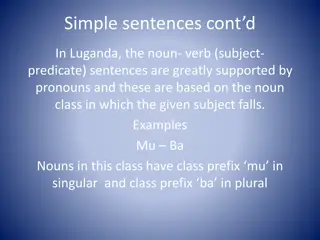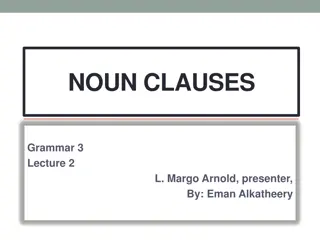WALT: use expanded noun phrases
Write expanded noun phrases using adjectives to describe Macbeth's appearance, characteristics, and surroundings. Enhance your writing skills with vivid details.
0 views • 5 slides
Guidelines for Expanded Access to Investigational Drugs and Devices
Providing guidance on types of Expanded Access for drugs, biologics, and devices, this content explains the concept of Expanded Access and the criteria that must be met. It covers different types of Expanded Access for drugs and devices, emphasizing the importance of patient safety and benefit. The
0 views • 10 slides
Understanding Different Types of Phrases in English Grammar
Explore the various types of phrases in English grammar, including noun phrases and adjectival phrases. Learn how modifiers can come before or after the noun in a phrase, and practice identifying these phrases in sentences. Enhance your understanding of grammar with clear examples and explanations.
1 views • 12 slides
Exploring Descriptive Detail Through Expanded Noun Phrases
Delve into the art of using expanded noun phrases for descriptive richness in writing, as showcased through authentic texts and engaging discussions. Uncover how these linguistic choices bring life to descriptions, enhance imagery, and spark creativity in readers' minds.
0 views • 6 slides
Understanding English Grammar and Traditional Grammar Concepts
English grammar involves the study of sentence and word structure, focusing on syntax and morphology. It includes rules governing the combination of words into well-formed phrases. Traditional grammar categorizes words into parts of speech such as nouns, articles, adjectives, verbs, adverbs, preposi
2 views • 15 slides
Exploring Language Evolution: How Language Changes Over Time
Delve into the fascinating topic of language evolution by understanding how language has transformed over the years, reflecting changes in our lives, experiences, and cultures. Engage in activities to grasp the shifts in vocabulary usage and expressions, such as interviewing individuals about their
4 views • 27 slides
Exploring Grandma's Features in "George's Marvellous Medicine
Delve into the detailed descriptions of Grandma from "George's Marvellous Medicine." Explore her features such as teeth, eyes, mouth, personality, skin, and nose through expanded noun phrases. Get ready to create vivid sentences describing Grandma using the unique characteristics identified.
0 views • 14 slides
Enhancing Descriptions with Expanded Noun Phrases
Learn how to transform simple noun phrases into detailed descriptions by adding adjectives to create expanded noun phrases. Explore examples and engage in an activity to practice using expanded noun phrases to describe characters effectively.
0 views • 6 slides
Understanding Noun Clauses in English Grammar
A clause is a group of words with a subject and a verb, while a phrase lacks one. Independent clauses can stand alone, while dependent clauses cannot. Noun clauses function as nouns in a sentence, serving different roles like subjects, objects, prepositional objects, and complements. They can start
1 views • 49 slides
Understanding Adjectivals in Noun Phrases: A Comprehensive Guide
Adjectivals, including determiners, adjectives, and nouns, play crucial roles in modifying nouns within noun phrases. This guide explores the different types of adjectivals, their positions within a phrase, the use of pre-headword modifiers such as determiners, and the order of adjectives and nouns.
1 views • 40 slides
Expanded Learning Opportunities Program Overview
The Expanded Learning Opportunities (ELO) Program is designed to cater to the academic, social, emotional, and physical needs of students through engaging learning experiences outside regular school hours. This program encompasses before school, after school, summer, and intersession learning activi
1 views • 8 slides
Understanding Noun Clauses in English Grammar
A clause is a group of words with a subject and verb, while a phrase lacks one. Noun clauses, functioning as nouns, serve various roles in sentences. They can be subjects, objects of verbs/prepositions, or complements. Starting with question words like what, when, or why, these clauses mirror statem
0 views • 49 slides
Understanding Noun Clauses and Their Functions
A clause is a group of words containing a subject and predicate forming part of a sentence. Noun clauses act as nouns in a sentence and can function in various ways, such as being the subject or object of a verb, participle, or preposition. They are identified by asking "who" or "what" questions and
0 views • 23 slides
Understanding Adjective Clauses and Noun Clauses in English Grammar
Learn the key differences between adjective clauses and noun clauses in English grammar. Adjective clauses describe nouns, while noun clauses take the place of a noun in a sentence, serving as either the subject or object of a verb. Discover how to identify and use these clauses effectively through
0 views • 10 slides
Engaging Grammar Talk for Writing Pedagogy
This PowerPoint explores the importance of talk in grammar for writing pedagogy, providing practical ideas for facilitating language-based discussions in the classroom. It delves into topics such as expanded noun phrases and descriptive language through engaging classroom activities and examples fro
1 views • 30 slides
Mastering the Art of Introducing Quotes with Signal Phrases
Understanding the importance of signal phrases in academic writing. Signal phrases provide context, establish credibility of sources, and prevent dropped quotes. Learn the key elements required for an effective signal phrase and how to structure them using different formulas. Enhance your writing by
1 views • 16 slides
Understanding Prepositional Phrases and Their Usage
Prepositional phrases play a crucial role in describing the position, time, and manner of actions. This content explains the functions of prepositions, examples of prepositional phrases, and how to identify them in sentences. It also covers the definition of prepositions, examples of prepositions, a
0 views • 14 slides
Understanding Participial Phrases: Usage and Examples
Learn about participial phrases, their correct usage, and examples of both correct and incorrect placements. Explore how participial phrases modify nouns in sentences and how to identify and correct misplaced or dangling participial phrases.
1 views • 11 slides
Understanding Prepositional Phrases in Chinese Mythology
Explore the concept of prepositional phrases in the context of Chinese mythology. Learn about phrases, clauses, and how prepositions function in describing relationships within myths like the story of Nuwa and Fuxi. Identify prepositions, understand the formula for prepositional phrases, and discove
5 views • 7 slides
Understanding Grammatical Development in Speech-Language Pathology
Explore a broader perspective of grammatical development in speech-language pathology focusing on noun and verb phrase elaboration. Learn about identifying and elaborating noun phrases, substitution tests, and the elements of an elaborated noun phrase. Gain insights into clinical approaches and lang
0 views • 28 slides
Exploring Expanded Carrier Screening in Family Planning
Learn about expanded carrier screening as a tool for identifying genetic risks in family planning scenarios. Understand the importance of genetic testing, considerations for non-consanguineous couples like Julie and Chris, and the evolving landscape of genetic services. Explore key aspects such as f
1 views • 36 slides
Mastering Noun Phrases for Vivid Descriptions
Explore the art of crafting compelling noun phrases to vividly describe dragons and other fantastical creatures. Learn techniques such as using determiners, hyphenated adjectives, prepositional phrases, similes, and relative pronouns to create imaginative and detailed descriptions. Elevate your writ
0 views • 15 slides
Engaging English Activities for Year 2 Students
Engage Year 2 students in fun English activities including phonics games, spelling patterns, and creative writing tasks. Encourage them to write about their Christmas holidays, practice spelling patterns, draw their favorite Christmas present, and create expanded noun phrases. The activities are des
0 views • 5 slides
Analysis of William Blake's Use of Noun Phrases in "London
Exploring William Blake's poem "London," this analysis focuses on the use of noun phrases to describe people, places, objects, and emotions. By examining the nouns chosen by Blake and the patterns they form, we gain insight into the vivid and evocative imagery he creates. The expanded noun phrases i
1 views • 4 slides
Understanding Adverbs and Adverbials in English Grammar
Adverbs modify various elements in a sentence, such as verbs, adjectives, and even whole clauses. Not all adverbs end in "ly," and they can belong to categories like time, place, degree, and discourse markers. Adverbials are strings of words that modify functions, including prepositional phrases, no
1 views • 9 slides
Exploring Setting Through Noun Phrases in Narrative Descriptions
Establishing setting in narrative through the use of descriptive noun phrases is crucial for creating a vivid and immersive atmosphere. By carefully selecting and arranging nouns, authors can evoke specific moods and engage readers in a detailed visual experience. This approach enhances the overall
1 views • 6 slides
Enhancing Writing Through Detailed Noun Phrases
Explore the LEAD principles for connecting grammar with meaning and rhetorical effect in writing. Authentic texts are utilized to engage learners in deep metalinguistic learning. An interactive activity challenges readers to match descriptions with marine creatures based on detailed noun phrases. De
1 views • 6 slides
English Grammar Final Exam Review
Subordinate clauses, nominal phrases, and noun clauses are identified within the context of adjectival, adverbial, or nominal functions. The exercise covers recognizing nominal clauses following prepositions as noun phrases, pronouns, gerunds, or nominal clauses. Additionally, combining sentences us
0 views • 17 slides
Understanding Latin Noun Cases and Declensions
Explore the use and distinctions of Latin noun cases (Nominative, Genitive, Dative, Accusative, Ablative), along with the concept of declensions, genders, numbers, and cases. Learn how to determine the declension, gender, number, and case of a Latin noun through its endings, and delve into examples
0 views • 23 slides
Understanding Adjective Phrases in English Grammar
Learn about adjective phrases in English grammar through examples and explanations. Explore how these phrases describe nouns or pronouns, answer questions like "What kind?" or "How many?", and usually follow the words they describe. Enhance your understanding with practice exercises and tips for ide
0 views • 27 slides
Understanding Phrases and Clauses in English Grammar
This content dives into the concepts of phrases and clauses in English grammar, presented by Assistant Professor Dhanaji V. Thore. It explains how a phrase is a group of related words lacking a subject and predicate, while a clause contains both a subject and a predicate to form a complete sentence.
0 views • 23 slides
Understanding English Phrase Structure: Analysis and Examples
Explore the morphosyntactic analysis of English phrases and the grammatical hierarchy, delving into sentence constituents, clauses, phrases, words, and morphemes. Learn about different types of phrases, their structures, and elements like modifiers, headwords, and grammatical markers, with illustrat
0 views • 30 slides
Mastering Noun Phrases for Expertise in Language
Explore the power of crafting precise noun phrases to elevate your expertise on any topic. Unveil the secrets of using nouns strategically to convey depth and authority in your writing. Dive into the world of language detectives and uncover the nuances of language through the lens of noun phrases. E
0 views • 10 slides
Understanding Word Classes and Noun Functions in Grammar
Explore the concept of word classes such as open class and minimum free form, structural vs traditional grammar, count abstract vs concrete nouns, noun phrase extensions, properties of nouns, and noun functions in language. Enhance your understanding of adjectives, determiners, prepositions, and var
0 views • 28 slides
Understanding Phrases, Clauses, and Sentence Types in Grammar
A phrase is a group of words within a clause that conveys meaning, such as noun phrases, verb phrases, adjective phrases, adverbial phrases, and prepositional phrases. Clauses are groups of words containing a subject and a verb, with independent and dependent clauses being the two main types. Indepe
0 views • 33 slides
Understanding Noun Phrases: Definitions and Examples
Noun phrases are essential components of language that consist of a noun and other words that describe or modify it. This article provides definitions for key terms related to noun phrases, such as nouns, determiners, quantifiers, prepositions, adjectives, and adverbs. Examples and images help illus
0 views • 12 slides
Understanding Syntax in Linguistics
Words in a language are organized into phrases and clauses with specific syntactic categories like Noun Phrase, Verb Phrase, and Adjective Phrase. Each phrase has a head such as a noun, verb, or adjective, and phrase structure rules help diagram the syntactic structure. Clauses are the largest units
0 views • 20 slides
Understanding the Noun: Characteristics, Classification, and Functions
The noun is a fundamental part of speech expressing various concepts such as names of objects, living beings, places, materials, processes, and more. It is characterized by semantic features, formal criteria including derivational features, grammatical categories like number and gender, and combinab
0 views • 18 slides
Luganda Noun-Verb Sentences and Pronouns
Explore Luganda noun-verb sentence structures supported by pronouns based on noun classes, specifically Mu-Ba and Mu-Mi, with examples showcasing singular and plural forms. Learn how to construct simple sentences using various nouns in these classes.
0 views • 6 slides
Understanding Noun Clauses in Grammar
Noun clauses are dependent clauses that act as nouns in sentences, serving as subjects, verb objects, prepositional objects, and complements. They should not be separated from main clauses with punctuation. Noun clauses can appear at the beginning of a sentence or after certain nouns, adjectives, an
0 views • 77 slides
